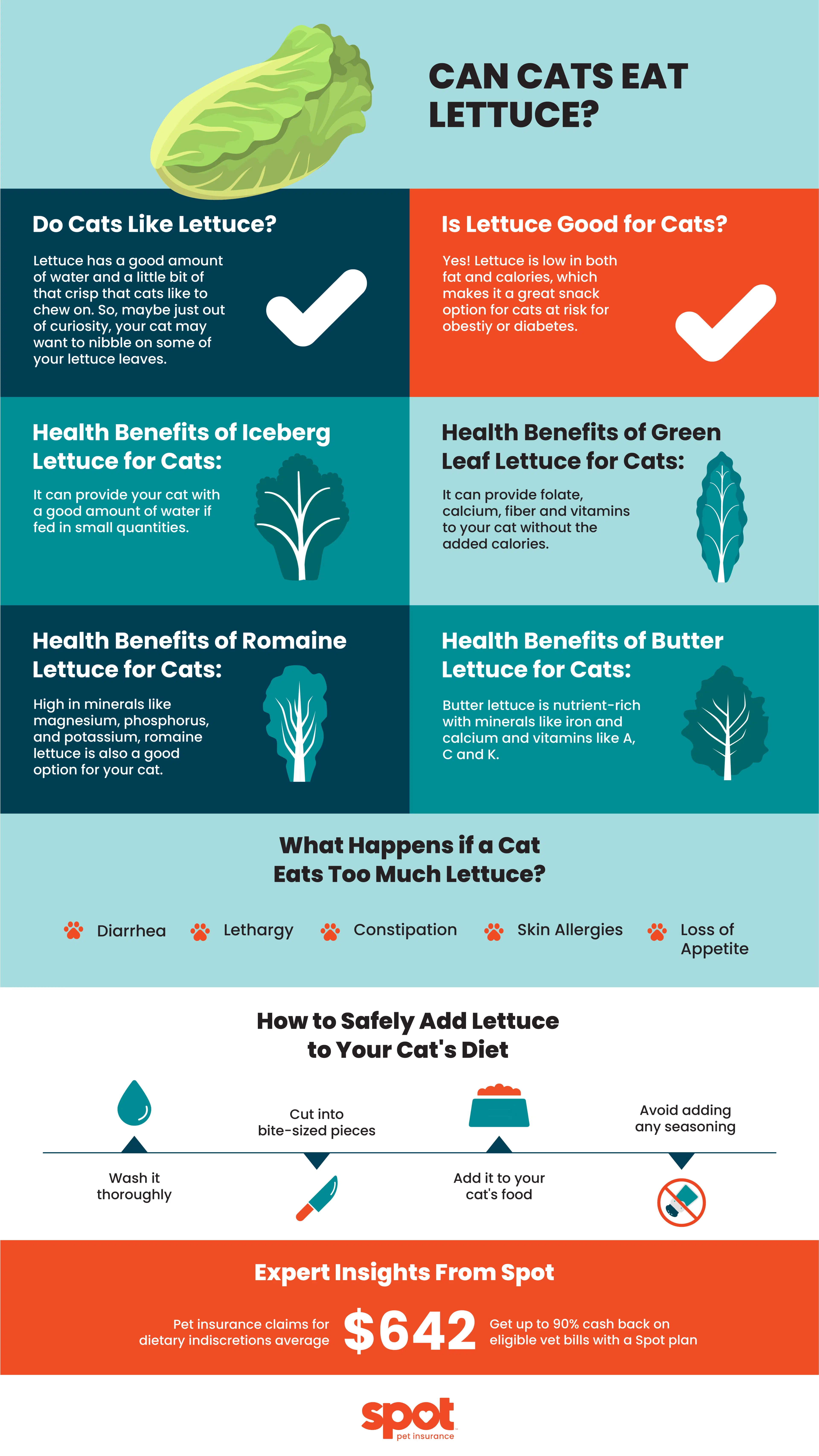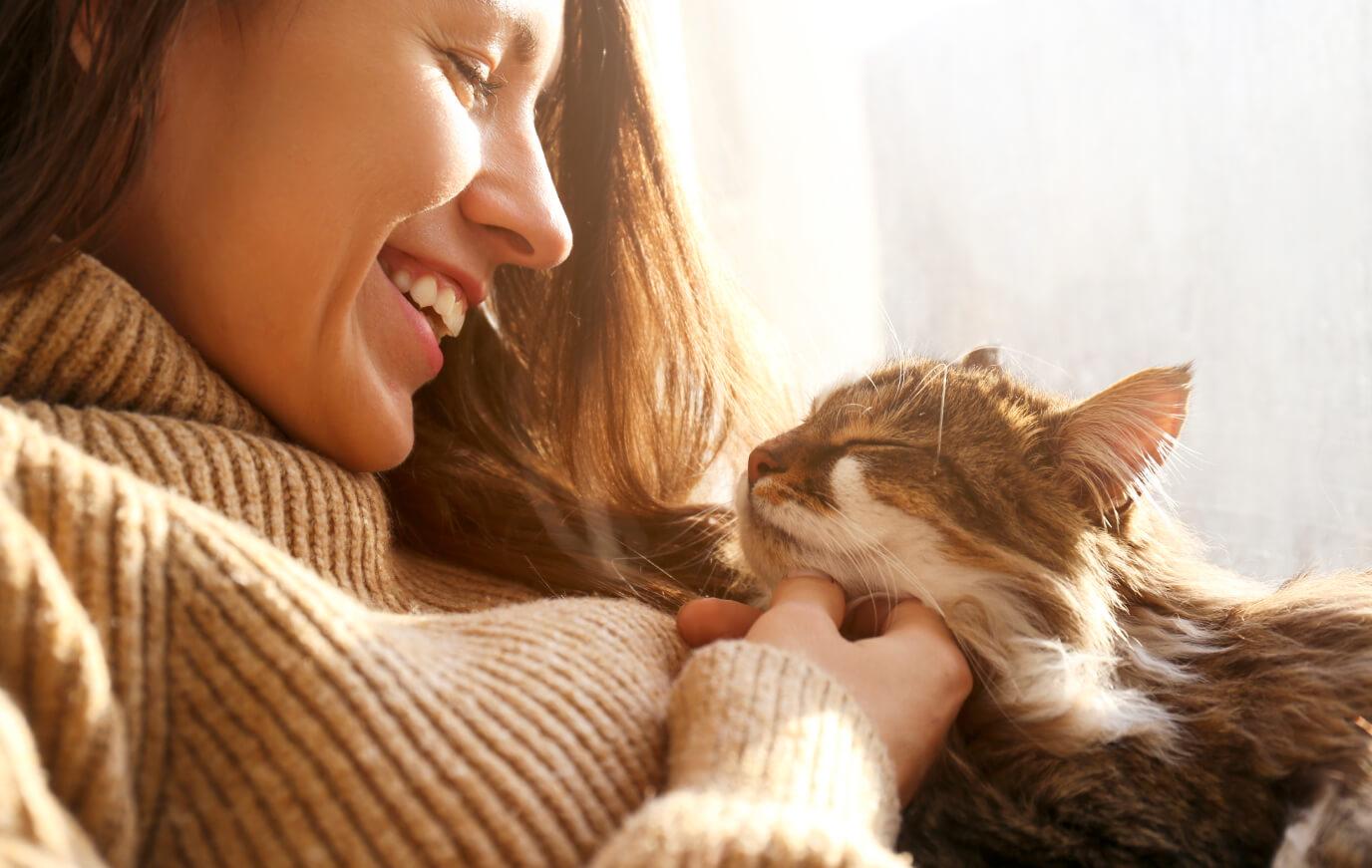While you’re Googling this question, it is highly possible that your cat might not think of lettuce as an attractive food item for them. To answer the question, yes. Cats can eat lettuce, but only in moderation.
We have been adding lettuce to our salads, burgers, sandwiches, and hundreds of other dishes for a long time. It’s natural for us to think that if it is healthy for humans, it must be good for our feline friends too. But that’s not always the case. Most of the time the answer to this question is no. As mentioned earlier, your cat likely won’t be attracted to lettuce in their lifetimes.

Do Cats Like Lettuce?
While we have taste buds that can help us enjoy lettuce in a particular way, our feline friends have different types of tastebuds. However, cats may be curious about the foods that their humans are eating. Lettuce has a good amount of water and a little bit of that crisp that cats like to chew on. So, maybe just out of curiosity, your cat may want to nibble on some of your lettuce leaves.
Is Lettuce Good for Cats?
The answer is, yes, but only in moderation. Cats are carnivorous in nature and are not supposed to be fed fruits and vegetables daily. Many vegetables are even toxic for them. But among those few human foods that are safe for them, lettuce is considered to be one of them.1
Lettuce is very low in fat and calories making it safe for cats to consume in moderation. A serving of 100 grams of lettuce consists of the following:2
Calories: 14
Fat: 0.14g
Sodium: 10mg
Carbohydrates: 2.97g
Fiber: 1.2g
Sugars: 1.8g
Protein: 0.9g
Potassium: 141mg
Vitamin C: 2.8mg
Iron: .41mg
Calcium: 18mg
Now if this is the deal for humans, it could look like a great deal for cats as well. Ultimately, it depends on the type of lettuce you’re feeding to your cat.
Health Benefits of Lettuce for Cats
There are 4 types of lettuce – Iceberg, Green Leaf, Romaine, and Butter lettuce. While all of them are considered safe for your cat in small quantities, the nutrients vary in each.3
Health Benefits of Iceberg Lettuce for Cats:
Iceberg lettuce is one of the most common varieties of lettuce. However, the nutritional content is limited here. It can provide your cat with a good amount of water if fed in small quantities.
Health Benefits of Green Leaf Lettuce for Cats:
While there is less water content in this type, the nutritional value is higher for cats in green leaf lettuce as compared to iceberg lettuce. It can provide folate, calcium, fiber and vitamins to your cat without the added calories.
Health Benefits of Romaine Lettuce for Cats:
High in minerals like magnesium, phosphorus, and potassium, romaine lettuce is also a good option for your cat.
Health Benefits of Butter Lettuce for Cats:
Butter lettuce is nutrient-rich with minerals like iron and calcium and vitamins like A, C and K.
Apart from these differences, lettuce, irrespective of its type, can help keep your cat away from your house plants.
How Much Lettuce is Good for Your Cat?
Looking at the potential benefits of feeding your cat lettuce may lead you to wonder if you should consistently add lettuce to your cat’s daily diet. Do not. We can reiterate the fact here that cats are carnivorous in nature and the maximum nutrition they should be getting is from meat. While feeding lettuce can be safe and provide your cat with benefits, it should be done in moderation.
How Can You Feed Lettuce to Your Cat?
You may be wondering, how should you feed your cat lettuce? Before offering it to your cat, you should know how to prepare it for them.
Wash it thoroughly – We do not want any type of dirt or pesticide to enter your cat’s digestive tract. It is important to wash it thoroughly before chopping.
Cut in small pieces – To help avoid the risk of a choking hazard, make sure you cut the leaf into very small pieces.
Not alone – Do not make lettuce the only meal of the day.
No fancy stuff – Do not add any type of seasoning to the lettuce. Butter, garlic, onions, etc. are all a big NO for your cat.
What Can Happen if Your Cat Eats an Unusual Amount of Lettuce?
If your cat accidentally eats more lettuce than they should have while your back was turned, keep an eye out for symptoms of an upset stomach. Vitamin A toxicity is another possible health hazard that can happen if your cat eats too much of lettuce. Symptoms to be on the lookout for include1 –
Diarrhea
Lethargy
Constipation
Skin Allergies
Lameness
Loss of appetite
Which Cats Should Not Eat Lettuce?
There can be some cats, not specific to any breed, which can be more susceptible to stomach harm from lettuce. This can include:
Cats with allergies or food intolerances – Lettuce can be cross-reactive with certain allergens. If your cat is allergic to things like mugwort or other grasses, they may also be allergic to lettuce.
Expert Insights From Spot
As much as we love to spoil our cats with treats from our own plates, it's important to remember that some human foods can be harmful to pets. Spot's internal data indicates that pet insurance claims for dietary indiscretions average $642*, highlighting the need for careful consideration and research before offering cats any human food.
How Can Having an Insurance Policy Help Here?
At Spot Pet Insurance, we want our pet parents to worry less about the costs of taking care of their pet. Our plans help cover the costs of unexpected accidents and illnesses with up to 90% cash back on eligible vet bills and access to a 24/7 Pet Telehealth helpline so that you can have someone by your side to help guide you through questions about your cat’s behavior and health.
Takeaway
Lettuce is considered a safe food for your cat to eat in moderation. It should never form more than 10% of your cat’s diet. Follow the directions carefully and you could end up with a healthy and hydrated cat!
Happy mood and health to your purry friend and lots of love and licks to you! (Licks by your cat).

I've had the privilege of immersing myself in the realm of pet safety. As the owner of an energetic mini golden doodle, I know just how stressful being a pet owner can be. I am dedicated to ensuring our beloved pets enjoy a life brimming with good health.
*Jan 2019 to Aug 2024 administrator claims data. Individual reimbursement results and coverage vary based on plan type.
Jones, Dexter. “Can Cats Eat Lettuce?” We Love Cats and Kittens, 29 Aug. 2023, welovecatsandkittens.com/cat-health/can-cats-eat-lettuce.
“Calories in Lettuce and Nutrition Facts.” Fatsecret, n.d., www.fatsecret.com/calories-nutrition/generic/lettuce-raw.
Adams, Christian. “Can Cats Eat Lettuce? Vet-Verified Benefits & Precautions” Catster, 20 Nov. 2024, www.catster.com/nutrition/can-cats-eat-lettuce/.
The information presented in this article is for educational and informational purposes only and does not constitute or substitute for the advice of your veterinarian.












